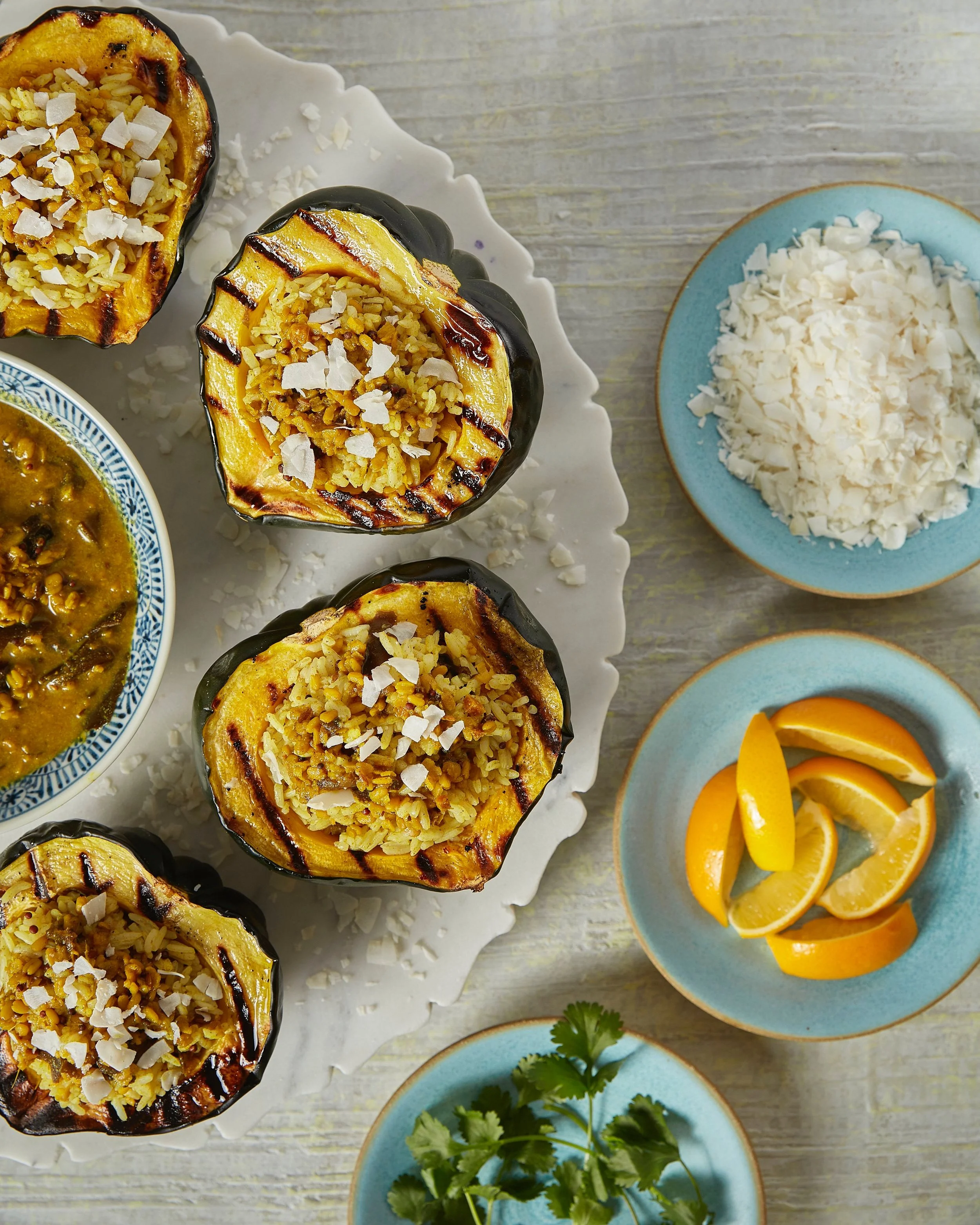Going with your Gut
Trevor Ring transforms food and community with fermentation
“It’s not about me anymore. It’s about the microbes”.
Trevor Ring, owner of Community Cultures, says this reflecting on the future of his educational fermentation lab. I first had the opportunity to meet Trevor during a virtual community kimchi workshop. He gently encouraged shy participants to turn on their cameras and share why they wanted to learn how to make kimchi. He intentionally connected with each workshop attendee and fostered a warm communal space in what can often be a stale, virtual setting. Trevor’s approachable teaching method put students at ease as he compassionately dispelled myths about fermentation. “We've gotten to this point in our culture and our food system where if you see anything that looks strange, you throw the whole thing out and that is coming from our fear of bacteria. We’re coming out of a pandemic, and there is a fear of microscopic things...And it’s totally understandable.”
The fermentation process can seem daunting, but Ring has a knack for explaining why it shouldn’t be. “I tell people to compare that to the raw vegetables you get from the store and how many outbreaks there are from Romaine lettuce or whatever. [Fermentation is] very safe, it's something that people have been doing for thousands of years and it really entails observing and staying on top of it and tasting along the way.” Trevor offers affordable fermentation workshops for anyone interested in crafting things like sauerkraut, shoyu, miso, and more. Ring uses his love of fermentation as a lens for how he wants to positively impact our food system. “There’s something that’s so simple and empowering about transforming your food that way rather than pasteurizing it and sanitizing everything. You’re honoring the livelihood, or the life within the food. I just started diving into that idea and thinking about how I can bridge that with creating a business model that is also empowering people.”
Trevor became interested in food at a young age but wondered what his place would be within the food world. In what he describes as “typical millennial fashion”, he was searching for a career that allowed him to make the most positive impact. Culinary school at Paul Smith’s College taught him that he didn’t want to be a chef. Studying Sustainable Agriculture at Sterling College showed him that he didn’t want to farm.
Immersing himself in Italy while studying abroad illuminated the many ways our current food system in the US leaves much to be desired. “I was seeing things like backyard farms and agri-tourism in Italy and how connected so many people were to their food.” The high prominence of worker-owned co-operatives and the respect that Italians had for their food inspired him to assess what he could do to create positive change back home.
These eye-opening experiences deeply impacted the way that Trevor valued food, but it was one of his closest friends at Sterling who introduced him to fermented foods. His friend Malaika gave him some kombucha to try and he was forever changed. “It was so fascinating and tangy and very different. Somehow I got my hands on a kombucha mother and started making my own dorm-brewed kombucha in small batches.” Tasty benefits aside, Trevor was also amazed with how much better he felt after drinking kombucha. “I’ve had digestive issues throughout my life, and I recognized that a small shot of very strong kombucha made my stomach pain go away in a few minutes and I was so amazed. Not only is it so flavorful and delicious, but it also has what I felt were like magical healing powers. I had never experienced anything like that. For the first time, through food, I actually was able to feel a difference in my pain.”
Using the art of fermentation allowed Trevor to combine his experiences in food production with his culinary skills. At South River Miso, an artisan miso company in Massachusetts, Ring spent two years honing his craft through fermenting beans and rice in the traditional Japanese style. Preparing food in the same method that humans used thousands of years ago allowed him to appreciate the art behind what he ate. Trevor began using his fermentation background to teach workshops, and ultimately decided to attend Chatham University’s Master of Food Studies program to expand his knowledge on the food system. The concept behind his accessible, educational fermentation business was developed during research for his thesis. “Now that I know more, I also know what might be really important,...what skills I have and what I can contribute.”
These contributions have turned into community workshop partnerships with the Phipps Conservatory, the Center for Regional Agriculture, Food and Transformation (CRAFT) and events like last year’s “Ferment for Food Justice'' conference. Trevor offers scholarships, solidarity and sliding scale pricing options for his classes to ensure that everyone has access to fermentational knowledge. He frequently collaborates with fermentors from all over the world to create communal spaces centered around preserving the art of fermentation. Community Culture’s business model is all about removing barriers that community members may face when trying to learn a new skill.
I asked Trevor if there were any obstacles that impact the future of Community Cultures. “Right now I am exploring how to actually make this sustainable for me, because I’m still relying on another full time job for my income. I feel like I'm stuck in this place where I am on the edge of having a full-time job and therefore having health benefits. I keep coming back to how many opportunities would be created if we had a universal healthcare system. How do you make the time to start a business on the side? I think it is a common problem with entrepreneurs.” Ring believes that providing resources through food incubators, supporting work-owned co-ops and increasing accessibility for entrepreneurs would benefit our food system tremendously. “I think that so many people have dreams that they want to pursue and there are all these barriers.”
In the meantime, Community Cultures will continue sharing fermentation goodness with Pittsburgh and beyond. This summer Trevor debuted a seasonal Soda CSA that uses locally sourced ingredients to create wild-fermented sparkling beverages. From June until October, he’ll be foraging and fermenting local produce to add into the mix. Trevor’s soda comes packaged in a simple yet thoughtful manner that any fan of artisanal products would appreciate: swing-top bottles ripe with condensation and full of the promise of delicious flavors. Each bottle comes with a handwritten note describing the fresh ingredients.
The flavors will change throughout the course of the CSA, but one thing that patrons can consistently expect is clear effervesence that is in tune with the season. “Much of [my sodas] represent the local landscape of Pittsburgh--in many ways it’s the landscape fermented and put into a bottle to let carbonate...I utilize herbs from Cutting Root Apothecary, maple syrup from Paul Family Farms, local honey, and other local farms when needed and possible.” I had the chance to try his chamomile and hibiscus mint sodas not too long ago and was surprised by how mellow the palate-pleasing tastes were. The bubbles provide a soft tingle on the tongue that doesn’t compete with the flavors, and the level of acidity is lower than what you might normally find with kombucha. “You might get notes of acidity, but it’s usually not harsh (which kombucha can be) and doesn’t dominate the flavor (which sometimes kombucha does). When I first started making tibicos (which is also a SCOBY like kombucha), I completely transitioned away from making kombucha. “
If you are familiar with kefir water, then you will know the calm and adaptable flavors that Trevor speaks of when referring to the tibicos culture. Future potential flavors like Mulberry Elderflower, Wineberry & Holy Basil will pair perfectly with the “perfect slate” that tibicos provides. And if you’re like the rest of us at TABLE and you thought, “Wow, these flavors would be great in a cocktail” then A) you would be correct and B) we should probably be best friends. His sodas also serve as the perfect base for mixed drinks and have a great level of complexity that not much else is needed. Trevor has personally enjoyed his sodas with gin, rum and whiskey. I can personally attest that a shot of tequila is also a great addition to consider.
In terms of food pairing, Trevor has plenty of ideas on complimentary summer dishes that would go well with his sodas. “Tacos, savory sourdough pancakes, spicy chicken, burgers--really, anything you might want to drink a bubbly beverage with.” Whatever food you decide to pair your soda with, you can be sure that your beverage will be sourced with intention and crafted with care. In addition to their luscious flavors, they also have more to offer in terms of health. “I’m going to take advantage of all of these fruits and different aromatic herbs. I have some herbalism background, so I’ll talk about the benefits of them and dive into that. I’m excited for that.”
We’re excited too.
Trevor has future plans of collaborating with local restaurants and cafes for distribution, but in the meantime soda enthusiasts should head over to his website if they want to get their hands on one of his bottles. If you would like to sign up for a soda CSA, head over to communitycultures.com to sign up. Registration ends June 30th.
Story by Frankie Williams
Photography by Dave Bryce
Styling by Keith Recker
12 Month - 6 issue subscription












Indulge in the taste spring with this delicious Cherry Galette